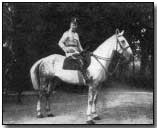Primary Documents - Crown Prince Wilhelm on the End of the Battle of Verdun, September 1916
 Reproduced below is
Crown
Prince Wilhelm's account of the end of the German offensive
launched
against French-held Verdun on 21 February 1916.
Reproduced below is
Crown
Prince Wilhelm's account of the end of the German offensive
launched
against French-held Verdun on 21 February 1916.
Wilhelm headed the Verdun offensive, appointed to the task by German Army Chief of Staff Erich von Falkenhayn. Often described as the greatest battle of the war, casualties on both sides were immense. Falkenhayn's stated intention was to "bleed France white" in the latter's defence of Verdun.
Such virtually proved to be the case - although the scale of German losses brought Falkenhayn much criticism. Indeed the failure to capture Verdun ultimately resulted in Falkenhayn's removal as Chief of Staff and Paul von Hindenburg's installation (along with Erich Ludendorff). The Crown Prince was himself subsequently described as "the butcher of Verdun" for his role in the battle.
His account below (taken from his post-war memoirs) alludes to his reputation following the calling off of the offensive.
Click here to read Falkenhayn's justification for the offensive. Click here to read Crown Prince Wilhelm's summary of the battle. Click here to read von Hindenburg's decision to call off the offensive. Click here to read Erich Ludendorff's dismissive view of the battle. Click here to read Joseph Joffre's August 1916 summary of the battle. Click here to read British newspaper baron Lord Northcliffe's despatch during the early days of the battle. Click here to read a French memoir of the German attack on Le Mort Homme in May 1916. Click here for a memoir of the struggle for Fort Douaumont the same month. Click here for a memoir of the German assault upon Fort Vaux in June 1916. Click here to read General Millerand's official account of the see-saw fighting at Thiaumont in July and August 1916. Click here to read a semi-official German historian's account of the end of the battle. Click here to read General von Zwehl's memorandum issued immediately before the French recapture of Forts Vaux and Douaumont. Click here to read Ludendorff's statement regarding the loss of Forts Vaux and Douaumont. Click here to read French General Pierre Dubois's view of the German approach at Verdun. Click here to read a French staff officer's account of the recapture of Fort Douaumont in October 1916.
Crown Prince Wilhelm on the End of the Battle of Verdun
When the situation at Verdun became so acute that, in view of the futility of the sacrifices I felt unable to sanction the continuation of the attack, I reported personally to the Kaiser and made written representation to the G. H. command.
Thereupon the Kaiser adopted my view and granted the desired cessation of the attack.
After the resignation, on August 29th, of General von Falkenhayn, the head of the Commander-in-Chief's General Staff and of the Operation Department, the orders to cease attacking were issued by Field Marshal General von Hindenburg on September 2nd, 1916, together with instructions to convert into a permanent position the lines that had been reached.
The newspapers at home were cruelly unjust to me in this, representing me as responsible for all the bloodshed. They even called me "the laughing murderer of Verdun."
Our soldiers at the front knew better. A dozen incidents showed their affection for me, and their knowledge as to where the responsibility really lay.
Source: Source Records of the Great War, Vol. V, ed. Charles F. Horne, National Alumni 1923
A 'Tracer' was a phosphorescent machine-gun bullet which glowed in flight, indicating course as an aid to artillery.
- Did you know?
